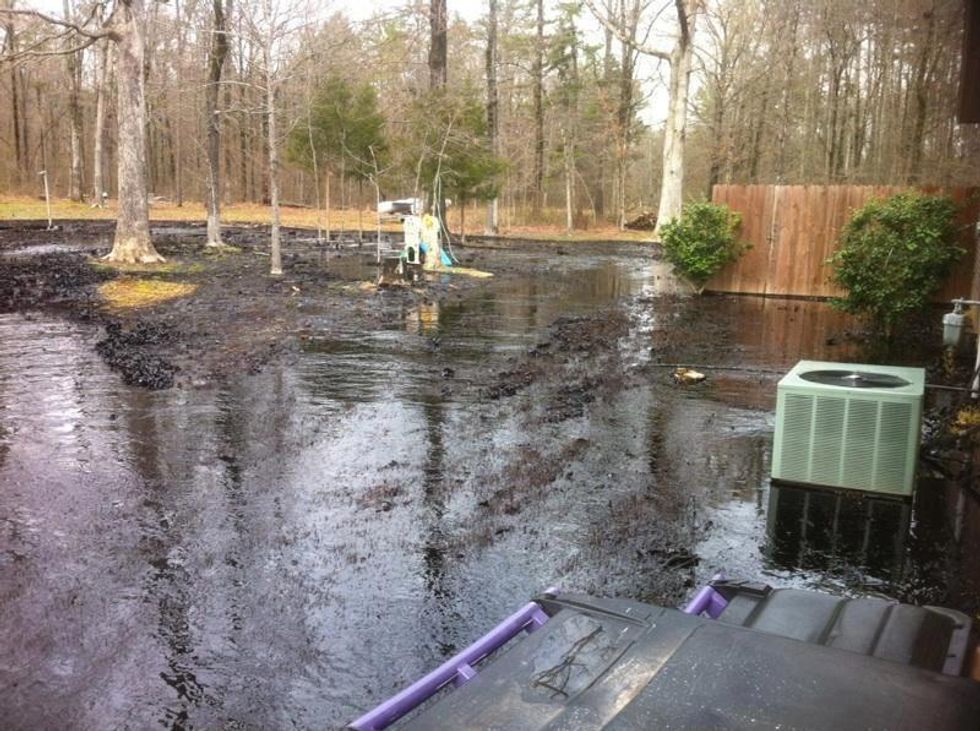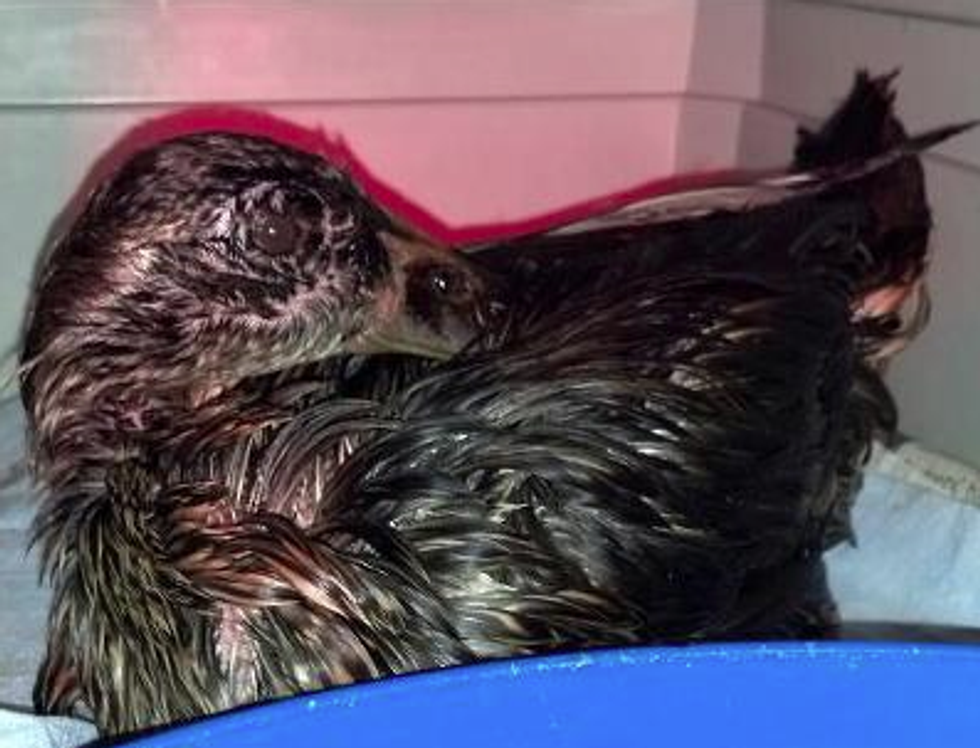Exxon Tar Sands Spill Continues to Devastate Arkansas Community
Estimates of spilled oil "growing exponentially every day"

Though the exact amount of spilled oil remains unknown, as the National Wildlife Federation writes, "just as we saw in the early days of BP's Gulf oil disaster, the number is growing exponentially each day."
"Exxon Mobil officials said the total amount of water and oil pumped out of a Mayflower subdivision nearly tripled Sunday, reaching 12,000 barrels, or 504,000 gallons, compared with estimates on Saturday that crews had pumped 4,500 barrels," reports the Arkansas Democrat-Gazette Monday morning.
Though the cleaning crews have reportedly removed most of the freestanding oil which covered the neighborhood streets, local news station KATV touring the area on Sunday, said that removing the crude from individual's backyards promises to be "a much more challenging project to take on."
"This is going to be an extensive and long cleanup," said onsite EPA coordinator Nicolas Brescia. "Right now, the goal is to pick up as much free product as they can." He added, "I can't tell you how long it's going to take to clean up all the impacted areas."
"The Mayflower tar sands spill is yet another demonstration of the risks that tar sands pipelines pose to the communities and sensitive water resources they cross," writes Anthony Swift of the Natural Resources Defense Council, adding that the spill is also a warning of "the potential costs of the tar sands industry's reckless expansion plans."
Environmentalists are pointing to the Mayflower rupture as further evidence that the authorization of the Keystone XL tar sands pipeline would pose "significant risk" to our communities and ecosystems.
"We'd be wise to think about this as one more sad warning," said 350.org founder Bill McKibben, in a statement responding to the spill. "What the people of Arkansas are enduring today is a reminder of why approving KXL, a pipeline ten times as large and running across the Oglalla Aquifer, defines a bad idea."
The greatest priority in the Mayflower clean up still appears to be preventing the oil from traveling through the community's storm drain system to Lake Conway, a large man made recreation reservoir stocked with bass, catfish, bream and crappie. The National Wildlife Federation reports that local authorities built several earthen dams to try to prevent the tar sands oil from reaching the lake, "but if the water is fouled," they said, "it won't just threaten the fish, it will threaten the area's recreation economy."
Local animal wildlife rehabilitation clinic, the HAWK center, posted images on their facebook page of recovered birds coated with the thick, black tar.
"We anticipate a LOT more patients today," they write.

As of Sunday evening, officials from neither the town or the energy giant behind the spill were able to provide answers to the 22 evacuated households as to when they would be able to return home or why the spill occurred. An investigation is reportedly underway.
Tweets about "arkansas oil spill"
__________________________
An Urgent Message From Our Co-Founder
Dear Common Dreams reader, The U.S. is on a fast track to authoritarianism like nothing I've ever seen. Meanwhile, corporate news outlets are utterly capitulating to Trump, twisting their coverage to avoid drawing his ire while lining up to stuff cash in his pockets. That's why I believe that Common Dreams is doing the best and most consequential reporting that we've ever done. Our small but mighty team is a progressive reporting powerhouse, covering the news every day that the corporate media never will. Our mission has always been simple: To inform. To inspire. And to ignite change for the common good. Now here's the key piece that I want all our readers to understand: None of this would be possible without your financial support. That's not just some fundraising cliche. It's the absolute and literal truth. We don't accept corporate advertising and never will. We don't have a paywall because we don't think people should be blocked from critical news based on their ability to pay. Everything we do is funded by the donations of readers like you. Will you donate now to help power the nonprofit, independent reporting of Common Dreams? Thank you for being a vital member of our community. Together, we can keep independent journalism alive when it’s needed most. - Craig Brown, Co-founder |

Though the exact amount of spilled oil remains unknown, as the National Wildlife Federation writes, "just as we saw in the early days of BP's Gulf oil disaster, the number is growing exponentially each day."
"Exxon Mobil officials said the total amount of water and oil pumped out of a Mayflower subdivision nearly tripled Sunday, reaching 12,000 barrels, or 504,000 gallons, compared with estimates on Saturday that crews had pumped 4,500 barrels," reports the Arkansas Democrat-Gazette Monday morning.
Though the cleaning crews have reportedly removed most of the freestanding oil which covered the neighborhood streets, local news station KATV touring the area on Sunday, said that removing the crude from individual's backyards promises to be "a much more challenging project to take on."
"This is going to be an extensive and long cleanup," said onsite EPA coordinator Nicolas Brescia. "Right now, the goal is to pick up as much free product as they can." He added, "I can't tell you how long it's going to take to clean up all the impacted areas."
"The Mayflower tar sands spill is yet another demonstration of the risks that tar sands pipelines pose to the communities and sensitive water resources they cross," writes Anthony Swift of the Natural Resources Defense Council, adding that the spill is also a warning of "the potential costs of the tar sands industry's reckless expansion plans."
Environmentalists are pointing to the Mayflower rupture as further evidence that the authorization of the Keystone XL tar sands pipeline would pose "significant risk" to our communities and ecosystems.
"We'd be wise to think about this as one more sad warning," said 350.org founder Bill McKibben, in a statement responding to the spill. "What the people of Arkansas are enduring today is a reminder of why approving KXL, a pipeline ten times as large and running across the Oglalla Aquifer, defines a bad idea."
The greatest priority in the Mayflower clean up still appears to be preventing the oil from traveling through the community's storm drain system to Lake Conway, a large man made recreation reservoir stocked with bass, catfish, bream and crappie. The National Wildlife Federation reports that local authorities built several earthen dams to try to prevent the tar sands oil from reaching the lake, "but if the water is fouled," they said, "it won't just threaten the fish, it will threaten the area's recreation economy."
Local animal wildlife rehabilitation clinic, the HAWK center, posted images on their facebook page of recovered birds coated with the thick, black tar.
"We anticipate a LOT more patients today," they write.

As of Sunday evening, officials from neither the town or the energy giant behind the spill were able to provide answers to the 22 evacuated households as to when they would be able to return home or why the spill occurred. An investigation is reportedly underway.
Tweets about "arkansas oil spill"
__________________________

Though the exact amount of spilled oil remains unknown, as the National Wildlife Federation writes, "just as we saw in the early days of BP's Gulf oil disaster, the number is growing exponentially each day."
"Exxon Mobil officials said the total amount of water and oil pumped out of a Mayflower subdivision nearly tripled Sunday, reaching 12,000 barrels, or 504,000 gallons, compared with estimates on Saturday that crews had pumped 4,500 barrels," reports the Arkansas Democrat-Gazette Monday morning.
Though the cleaning crews have reportedly removed most of the freestanding oil which covered the neighborhood streets, local news station KATV touring the area on Sunday, said that removing the crude from individual's backyards promises to be "a much more challenging project to take on."
"This is going to be an extensive and long cleanup," said onsite EPA coordinator Nicolas Brescia. "Right now, the goal is to pick up as much free product as they can." He added, "I can't tell you how long it's going to take to clean up all the impacted areas."
"The Mayflower tar sands spill is yet another demonstration of the risks that tar sands pipelines pose to the communities and sensitive water resources they cross," writes Anthony Swift of the Natural Resources Defense Council, adding that the spill is also a warning of "the potential costs of the tar sands industry's reckless expansion plans."
Environmentalists are pointing to the Mayflower rupture as further evidence that the authorization of the Keystone XL tar sands pipeline would pose "significant risk" to our communities and ecosystems.
"We'd be wise to think about this as one more sad warning," said 350.org founder Bill McKibben, in a statement responding to the spill. "What the people of Arkansas are enduring today is a reminder of why approving KXL, a pipeline ten times as large and running across the Oglalla Aquifer, defines a bad idea."
The greatest priority in the Mayflower clean up still appears to be preventing the oil from traveling through the community's storm drain system to Lake Conway, a large man made recreation reservoir stocked with bass, catfish, bream and crappie. The National Wildlife Federation reports that local authorities built several earthen dams to try to prevent the tar sands oil from reaching the lake, "but if the water is fouled," they said, "it won't just threaten the fish, it will threaten the area's recreation economy."
Local animal wildlife rehabilitation clinic, the HAWK center, posted images on their facebook page of recovered birds coated with the thick, black tar.
"We anticipate a LOT more patients today," they write.

As of Sunday evening, officials from neither the town or the energy giant behind the spill were able to provide answers to the 22 evacuated households as to when they would be able to return home or why the spill occurred. An investigation is reportedly underway.
Tweets about "arkansas oil spill"
__________________________

